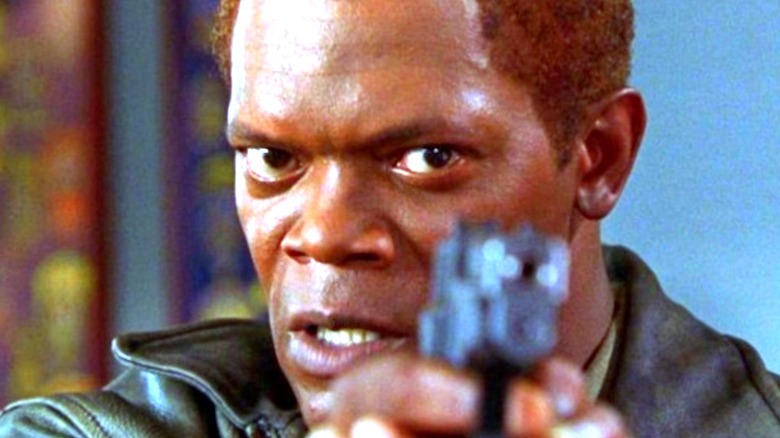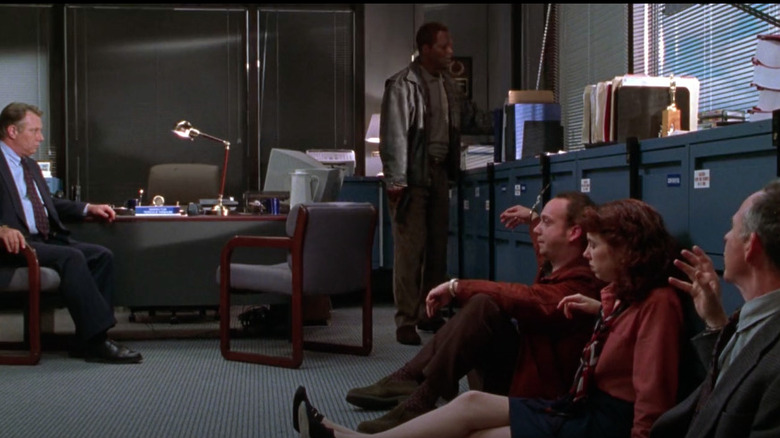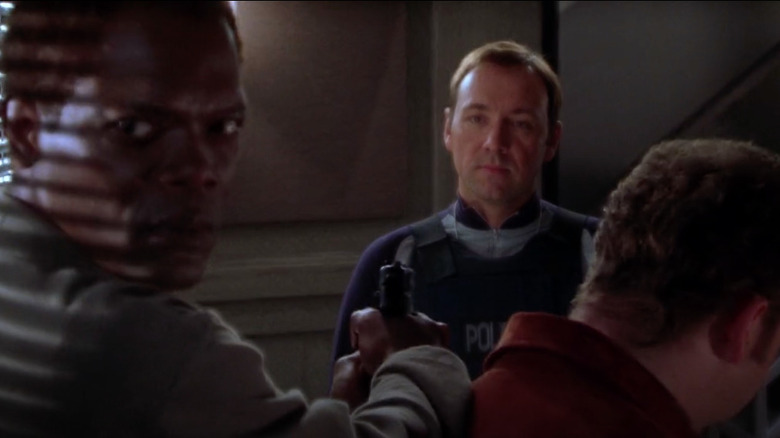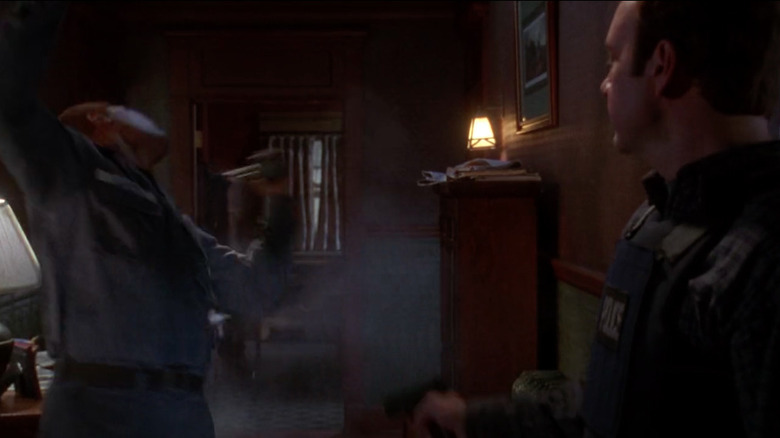The Ending Of The Negotiator Explained
Can you truly trust someone who lies for a living? That's the question at the center of "The Negotiator," a 1998 action drama starring Samuel L. Jackson before he embraced his baldness, and co-starring Kevin Spacey before the world embraced that he was a terrible person. Although the film doesn't rise to the pantheon of some of Jackson's more iconic roles, or the blockbuster power of his Nick Fury character, it's still a captivating movie which cleverly explores the themes of integrity, trust, and objective truth.
Jackson does an incredible job balancing the scales between his character's internal ethics, and his external acts of violence and immorality. He is continuously put into situations that test how much he is willing to compromise his conscience in order to find the truth. In this way, the plot explores the rationalizations people make for their behavior, and asks whether the ends really do justify the means.
The hostage negotiator is now the hostage taker
Jackson's character, Danny Roman, is introduced as a madcap police negotiator who talks down criminals during hostage situations. Right off the bat, we see how he uses deception, lies, and underhanded tricks to gain the perpetrators' trust and save those taken captive. This initial setup illustrates the contradictory nature of morality, by exemplifying that sometimes being dishonest can be the right thing to do, and how deceit with honorable intentions is occasionally the more virtuous path.
Later, when Roman's partner is murdered for uncovering an embezzlement scheme, and he is framed for the murder and theft, his fellow officers turn on him. Roman similarly loses faith in them, knowing that someone in his squad is responsible for setting him up. This situation illustrates that although lying with good intentions might sometimes be righteous, the loss of trust and objective truth has widespread consequences that create an epidemic of paranoia and animosity. No longer able to distinguish between his friends and enemies, he becomes incensed — and in an act of desperation, takes four people hostage.
When your friends betray you, sometimes the only people you can trust are strangers
Here, Roman is clearly acting unscrupulously and involving a terrified group of innocent people in order to save his own reputation. The same way that he is able to justify being duplicitous to save innocent victims in his work, he similarly rationalizes his current behavior as a necessary evil to prove his innocence. Ironically, the more ethical concessions he makes for the purpose of clearing his name, the more he compromises the same integrity he is trying to save.
As part of his plan, he demands on speaking with an outside negotiator named Chris Sabian (Kevin Spacey). Sabian's character mirrors Roman's tactics in his negotiations, similarly using trickery and lies to safely free hostages. However, Roman feels that since he has no one left to trust, Sabian's position as an outsider at least means that he has no hidden agenda — making him trustworthy. He punctuates the point by remarking, "When your friends betray you, sometimes the only people you can trust are strangers."
Eventually, Roman does find proof that exonerates him, but the actual perpetrators infiltrate the building and destroy it. In a last-ditch attempt at clearing his name, Roman escapes the building with Sabian — who has come to believe in his innocence — and they make their way to a house in search of copies of the destroyed evidence.
Sabien shoots Roman as a tactic to illicit a confession
Unfortunately, amid their search, the two are tracked down and cornered before they can find any proof. Panicked, Roman falls back on his negotiation instincts, and bluffs that he's found the evidence, hoping to coerce a confession. Before anything happens though, the precinct's Police Commander enters the house, orders the officers out, and implores Roman to hand over the evidence.
At this point, Sabian understands that the Commander is the true culprit — and in a tense moment, shockingly shoots Roman, in exchange for a cut of the stolen money. With Roman dead, the Commander agrees to the deal, and exits the house believing his deception remains intact. However, to his shock, he realizes that Sabian's bullet only caused a superficial injury, and his entire confession was broadcast to the precinct.
This final pretense brings our story full circle — ending as it started, with a deception for a righteous purpose.
This last charade strikes the perfect balance between trust and deceit. For the farce to have been convincing, Roman needed to unreservedly trust that Sabian had a noble reason for shooting him. Though it may not excuse the lengths Roman went to in order to clear his name, by choosing to put his complete faith in another person, he was able to restore his reputation and absolve his name.



